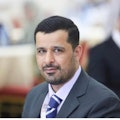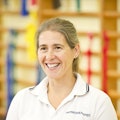The SPIN research group incorporates a team of Clinical Engineers and Physiotherapists specialising in clinical movement science. This group brings together skills and experiences from both disciplines to address challenges brought about by musculoskeletal and diabetic conditions.
Aims
- To improve understanding of human movement strategies and the applications of biomechanical analysis to optimise movement assessments into clinical practice
- To generate recommendations on how individuals with musculoskeletal conditions can benefit from exercise based on objective functional tests
- To find innovative ways of treating individuals with musculoskeletal and diabetic conditions using technology in the clinic and home settings
Research
The SPIN research group aims to use digital technology and movement science to find innovative solutions in improving the quality of healthcare provision for those living with musculoskeletal conditions and Diabetes.
We have access to laboratories with a range of state-of-the-art equipment, allowing us to complete high quality research in clinical movement analysis and physiotherapy.
Although not an exhaustive list, equipment and facilities we have access to include:
- BTS Bioengineering Podium Force Platform for force data collection, video recording and biofeedback
- Delsys Trigno Wireless Electromyography (EMG) system including both Trigno Avanti and Duo sensors for measuring the electrical activity produced by muscles during movement
- The MotekForceLink GRAIL system is a state-of-the-art facility for research, movement and rehabilitation assessment
- TRAK is web-based tool that can be used to provide a patient-focused approach by sharing information, improving exercise prescription, accessing advice from a physiotherapist and monitoring progress
- Xsens Dot IMU Sensors
- Xsens MVN Analyze System that allows us to accurately measure the kinematics and dynamics of joints and body segments using Inertial Measurement Units (IMU)
- Xsensor Clinical Insoles can provide plantar pressure data for functional tasks in the lab as well as remotely
Projects
- The Wales European Funding Office, Development of a Physiotherapy Intelligent Virtual Reality System, February 2021 for 6 months, (Mohammad Al-Amri (PI) & Kate Button (applicant))
- The European Regional Development Fund via the INTERREG France (Channel) England programme, Early Warning Wearable Device (EWWD) Project: An Innovative Remote Monitoring Solution That Supports Patients with Musculoskeletal Disorders and Diabetes, Whilst Creating Efficiencies in Clinical Management of Disorders, October 2020 for 30 months, (Mohammad Al-Amri (PI) & Kate Button (applicant))
- The Wales European Funding Office, Personalisation of Rehabilitation for Body Motion Related Injuries Through Wearable Electronics, January 2021-Jan 2022, (Mohammad Al-Amri (PI) & Kate Button (applicant))
- Institutional Strategic Support Welcome Trust Mobility and Skills research award, Consolidate Research Collaboration with the Research Group at University of Melbourne: Usability and acceptability of a portable virtual reality toolkit for people with knee pain, January- June 2020, (Mohammad Al-Amri (PI) & Kate Button (applicant)
- Cardiff Institute of Tissue Engineering and Repair Seedcorn award, “Development of a Portable Virtual Reality Physiotherapy Game for Knee Rehabilitation”, August 2019 – January 2020, (Mohammad Al-Amri (PI) & Kate Button (applicant)
- Institutional Strategic Support Fund Welcome Trust Public Engagement Proof-of-Concept award, “Stakeholder evaluation of a sensor-based movement toolkit intervention for physiotherapy of knee conditions: an all Wales approach”, August 2018 – August 2019, (Mohammad Al-Amri (PI) & Kate Button (applicant)
- Research capacity building collaboration Wales, “The patient experience of a biomechanically informed movement feedback approach to physiotherapy using wearable sensor technology”, July 2018 – June 2019, (Kate Button (PI))
Meet the team
Unit Lead
Academic staff
Publications
- Holden, M. A. et al., 2021. Guidance for implementing best practice therapeutic exercise for people with knee and hip osteoarthritis: what does the current evidence base tell us?. Arthritis Care and Research 73 (12), pp.1746-1753. (10.1002/acr.24434)
- Cudejko, T. et al. 2021. Applications of wearable technology in a real-life setting in people with knee osteoarthritis: a systematic scoping review. Journal of Clinical Medicine 10 (23) 5645. (10.3390/jcm10235645)
- Islam, R. et al., 2020. Non-proprietary movement analysis software using wearable inertial measurement units on both healthy participants and those with anterior cruciate ligament reconstruction across a range of complex tasks: validation study. JMIR mHealth and uHealth 8 (6) e17872. (10.2196/17872)
- Abdallat, R. et al., 2020. Dual-task effects on performance of gait and balance in people with knee pain: a systematic scoping review. Journal of Clinical Medicine 9 (5) 1554. (10.3390/jcm9051554)
- Wan, Y. et al., 2019. Effect of visual feedback on the performance of the star excursion balance test. Journal of Rehabilitation and Assistive Technologies Engineering 6 , pp.1-6. (10.1177/2055668319862139)
- Nicholas, K. et al. 2019. A qualitative evaluation of physiotherapists acceptability of a clinical sensor based approach to movement feedback rehabilitation. Osteoarthritis and Cartilage 27 (S1), pp.S447-S448. (10.1016/j.joca.2019.02.483)
- Al-Amri, M. and Button, K. 2019. Transforming physiotherapy rehabilitation: development of a sensor based portable movement analysis intervention. Presented at: 17th Asian Federation of Sports Medicine Congress Riyadh, Saudi Arabia 13-15th December 2019. , pp.-.
- Felemban, M. et al. 2019. Comparison of joint kinematics measurements during single leg distance hop by using body-worn sensors and video camera motion analysis.. Presented at: Physiotherapy UK Birmingham 1-2 November 2019. , pp.-.
- Wan, Y. et al., 2019. Effect of slope squat on lower-extremity muscle activity. Presented at: ISPGR World Congress Edinburgh, Scotland, U.K. 30 June - 4th July 2019. , pp.-.
- Al-Amri, M. et al. 2018. Inertial measurement units for clinical movement analysis: reliability and concurrent validity. Sensors 18 (3) 719. (10.3390/s18030719)
- Nicholas, K. et al. 2018. Sensor-informed physiotherapy following anterior cruciate ligament reconstruction: a case report. Presented at: 17th Annual Meeting of the Clinical Movement Analysis Society Dublin 12-13 April 2018.
Events
Applied Technology in Clinical Human Movement Analysis: This two-day course aims to provide comprehensive training in the principles of clinical technology essential to physiotherapy development
Schools
Images
Next steps
Research that matters
Our research makes a difference to people’s lives as we work across disciplines to tackle major challenges facing society, the economy and our environment.
Postgraduate research
Our research degrees give the opportunity to investigate a specific topic in depth among field-leading researchers.
Our research impact
Our research case studies highlight some of the areas where we deliver positive research impact.


